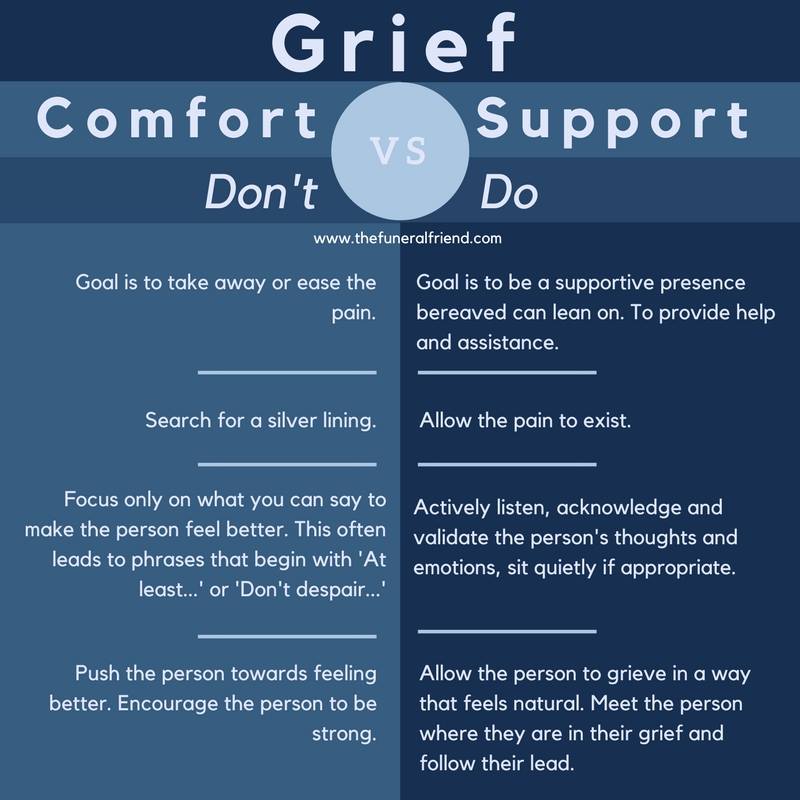Grief Support vs. Comfort: A pro-tip for the compassionate and caring
/ Supporting a Griever : Eleanor Haley
Litsa and I like to offer advice on supporting grievers. We've covered a lot of ground, from how to write a sympathy card to what to send instead of flowers to grievers helping grievers to what not to say to comparing grief; and yet we've been holding out on you. There is one painfully critical yet straightforward piece of advice we have yet to share.
Okay get ready for me to lay it on you...are you ready? Here goes.
The first thing one must do before setting out to help a grieving friend or family member is look in the mirror and repeat the following phrase:
"I am not a grief comforter; I am a grief supporter."
Say it again.
I am not a grief comforter; I am a grief supporter.
Bottom Line: It's better to be a grief support than a grief comfort.
You may think we're splitting hairs here, but we're not. Although these two things may sound similar, in this context, the ideas of 'comforting' and 'supporting' have two very different implications. Look at their definitions side by side:
Comfort: (noun) a state of physical ease and freedom from pain or constraint. (verb) make (someone) feel less unhappy; console.
Support: (verb) bear all of part of the weight of; hold up. (verb) give assistance to. (noun) the action of bearing the weight of something or someone or of being so supported. (noun) material assistance, i.e. emotional help offered to someone in distress, approval, and encouragement.
Do you see the differences? 'Comfort' implies a desire to free someone from their pain and make them feel less unhappy (good luck), while 'support' means a willingness to provide assistance and help.
When something sad or anxiety-producing happens in the life of someone we care about, our immediate instinct is to comfort. Of course, it is – we’re good people! And often this instinct is useful because comforting is precisely what the situation calls for; for example, a child’s bruised knee or a nervous first day on the job are both situations where a “There, there, you’ll be okay” goes a long way.
Over the years we've gotten good at the comfort bit, so sometimes when we approach a griever, our first inclination is to fall back on words of optimism. We really really want to take their pain away so we find ourselves saying things that begin with "at least" or "you can always," but it's phrases like these that are most apt to fall on deaf (or irritated) ears. Although we all know these sentiments are well-intentioned, they only minimize the gravity of their loss and the magnitude of what the griever is feeling.
In the beginning phases of grief, there is very little you can say to take away a griever’s pain, and there is very little value in summing up the situation with a positive or inspiring platitude. So, next time you find yourself patting the back of a grieving friend or family member saying, "God has a plan," we suggest you stop what you're doing and reframe your role immediately.
Repeat after me..."I am not a grief comforter; I am a grief supporter."
How to be a good grief supporter:
Being a grief supporter may or may not be your natural inclination, but as someone who knows how to be a good friend or family member (yes we're making some assumptions here) you probably already have the tools. One can be a good grief supporter through a willingness to:
- Show genuine caring and compassion: No one knows the perfect thing to say, so stop stressing. Instead, focus on treating the griever with caring and compassion. Sometimes this is as simple as asking how the person is doing and then actually listening to what they have to say.
- Provide concrete assistance: It's tempting to ask the griever to let you know what they need, but it's far more useful to offer specific help. Consider a list of things you can do. Hopefully, you know the griever well enough to predict a few of their needs.
- Actively listen: Talking to someone who will simply listen is often precisely what a griever needs. You may feel like you need to provide answers, but usually just having the opportunity to talk things out can help someone organize their thoughts and feelings. Besides, the conclusions they reach on their own are far more valuable than any given to them.
- Be present: Without hovering, be available to the griever by letting them know they can call at any time or by casually check in once in a while. Don't push and don't pressure. If they don't want to talk and if they don't take you up on your offers, that's okay. Also, grievers will still be hurting months, even years after a death, well after the casseroles and messages of concern stop rolling in. For this reason, the check-in’s that happen after they have mostly been left alone will send the message that you understand their pain is enduring and reminds them you will be there for them in the long-term. Make it casual, send a card or an e-mail; that way they can choose not to respond if they don’t feel like talking. Don’t take it to heart if you don’t get a response and follow their cues. If they don’t engage with you, it’s probably wise to give them a little space.

Honestly, none of this is new. We've already said each of these things in one way or another somewhere on the blog. We just thought it might help to spell it out because sometimes changing the way you view your role can change your approach.
Subscribe.
We wrote a book!
After writing online articles for What’s Your Grief
for over a decade, we finally wrote a tangible,
real-life book!
What’s Your Grief? Lists to Help you Through Any Loss is for people experiencing any type of loss. This book discusses some of the most common grief experiences and breaks down psychological concepts to help you understand your thoughts and emotions. It also shares useful coping tools, and helps the reader reflect on their unique relationship with grief and loss.
You can find What’s Your Grief? Lists to Help you Through Any Loss wherever you buy books:





robin kirk March 16, 2021 at 10:04 pm
My son died of a over dose. To fentany. He was 30 years old. I still am in shock its only been a week and i cant understand why he was my life my world
Eleftheria Louca January 12, 2019 at 8:43 pm
Hi,
I stumbled across this blog as I was looking for some comforting (note my faux pas!) words to send to a friend who is currently dealing with -what I believe you have previously mentioned as- Anticipatory grief. Their loved one is terminally ill and has been given weeks left. She doesn’t openly talk about it as we are in a work setting but often starts crying in the day. My question is, are the above steps different for those wanting to support a friend going through this type of grief?
Thanks so much, I have loved reading your blog and have bookmarked for future use.
Ellie